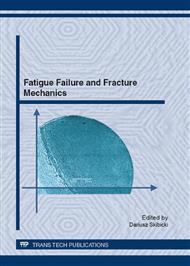p.110
p.118
p.125
p.133
p.143
p.150
p.156
p.162
p.171
Model of the Deformation Process under Thermo-Mechanical Fatigue Conditions
Abstract:
The paper focuses on the development of a mathematical representation of deformation characteristics under the conditions of an elevated changeable temperature and mechanical loads. The method proposed in the paper is based on the use of characteristics determined in low-cycle fatigue tests at constant temperatures. Hysteresis loops reflecting the behaviour of a material under the conditions of low-cycle loads at an elevated temperature were primarily used. The effect of relaxation on the course of the hysteresis loop was taken into account. The steady state of the material is referred to in the proposed representation. A calculation algorithm was developed to enable the determination of the stress value for subsequent increases of strain over time. The results obtained were compared with experimentally determined characteristics.
Info:
Periodical:
Pages:
143-149
DOI:
Citation:
Online since:
August 2012
Authors:
Price:
Сopyright:
© 2012 Trans Tech Publications Ltd. All Rights Reserved
Share:
Citation:


